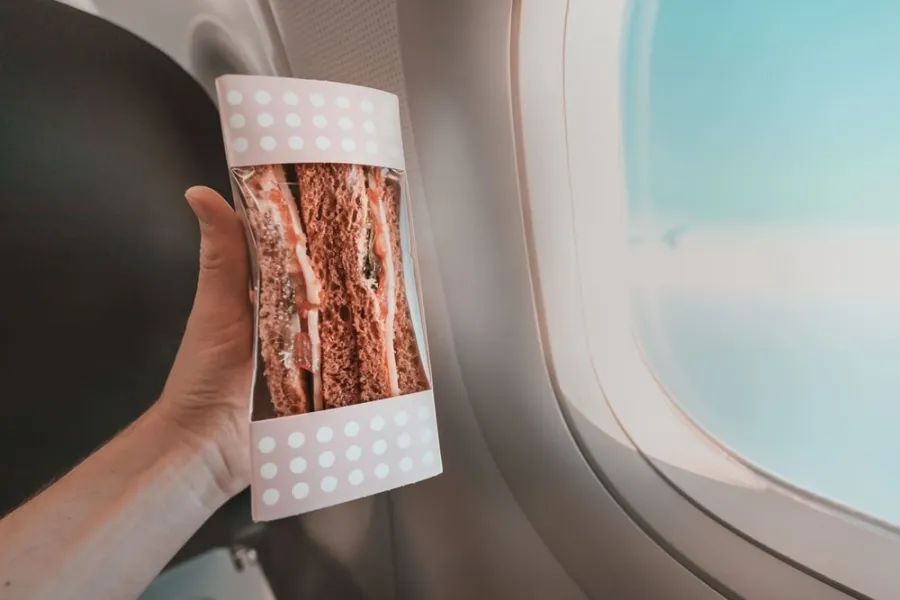Change language
Can you bring food through airport security? A complete guide for travelers
February 10, 2025

Traveling can be stressful, and figuring out what food you can bring through airport security only adds to the confusion. Many travelers worry about having their snacks confiscated, dealing with liquid restrictions, or even facing delays at security checkpoints.
Can you bring a homemade sandwich?
What about yogurt or a protein shake?
Will airport security allow you to carry fresh fruit or a packed meal for a long-haul flight?
Understanding the rules before you pack can save you time, hassle, and frustration. This complete guide will help you navigate airport food regulations so you can travel with confidence and enjoy your favorite snacks along the way.
Types of food you can bring through airport security
You can bring a variety of solid and some liquid foods through airport security, but certain restrictions apply, especially for liquids, gels, and spreads. Here’s a breakdown of the types of food you can bring:
These items can be packed in carry-on bags without restrictions:
- baked goods (bread, muffins, cookies, cakes, pastries);
- fruits and vegetables (fresh, dried, or whole; some international restrictions apply);
- nuts and seeds;
- sandwiches (without large amounts of sauces or spreads);
- granola bars, protein bars, and energy bars;
- chips, crackers, and pretzels;
- cheese (hard and solid types);
- cold cuts and cooked meats (wrapped properly);
- candy and chocolate;
- cereal and oatmeal packets;
- rice, pasta, and noodles (dry, uncooked);
- dehydrated or freeze-dried food;
- canned food (if no liquid is present).
All these foods can be taken in your carry-on luggage, and if you are denied boarding due to an issue related to your rights as a passenger, you may be entitled to compensation for denied boarding under airline regulations.
What food is not allowed in your hand luggage?
While many foods can be carried in hand luggage, some are restricted or prohibited due to liquid content, international regulations, or potential security concerns.
Any food that falls under the liquids, gels, or spreadable category must be in containers under 100ml and fit in a quart-sized bag. If it exceeds this limit, it must go in checked luggage or be discarded at security.
- soups, broths, stews, and sauces;
- gravy, curry, or liquid-based meals;
- yogurt, pudding, custard, and jelly;
- hummus, peanut butter, Nutella, and other spreads;
- creamy cheeses (brie, camembert, ricotta, cream cheese, etc.);
- salsa, guacamole, and dips;
- honey, syrup, jam, and preserves;
- canned foods with liquid (soups, fruit in syrup, etc.);
- bottled beverages (water, soda, juice, milk, alcohol, etc.).
Some foods are not allowed when traveling internationally because they may pose a risk to agriculture and food safety. Always check the customs regulations of your destination before carrying:
- fresh fruits and vegetables (restricted in many countries);
- raw meat, poultry, or fish;
- dairy products (milk, cheese, butter) in certain regions;
- seeds, nuts, or plants (some may be banned due to pest risks);
- homemade food containing animal products.
What can you do instead?
- If carrying liquids or gel-based foods, ensure they are in containers under 100ml.
- If bringing perishable or restricted foods internationally, declare them at customs upon arrival.
- Store frozen items with solid ice packs to keep them within security regulations.
Check out some rules and recommendations for the transport of pills during air travel, too!
How to pack food for airport security checks
Start by choosing foods that are solid and non-perishable, as these are the easiest to bring through security. Solid foods like sandwiches, granola bars, crackers, dried fruits, and nuts can be packed without restrictions in your carry-on bag. If you’re bringing perishable foods like cheese, cold cuts, or cooked meals, store them in leak-proof, airtight containers to prevent spills and maintain freshness. If you plan to carry frozen foods, use ice packs, but make sure they remain completely frozen at the time of security screening, as partially melted ice packs may be confiscated under liquid restrictions.
For foods that fall under the liquid or gel category, such as yogurt, peanut butter, hummus, soups, or sauces, ensure they comply with the TSA’s 3-1-1 rule. Each container must be 100 milliliters or less and fit into a quart-sized resealable plastic bag. If you have larger quantities, these should be packed in checked luggage instead. Baby food, breast milk, and liquid medications are exceptions to this rule but must be declared at security for screening.
It’s best to pack food in an easily accessible section of your carry-on, as security officers may request a closer inspection.
How to handle food rejections at airport security
The first step is to understand why your food was rejected. Airport security follows strict regulations, particularly regarding liquids, gels, and perishable items. If your food exceeds the 100 ml liquid limit, such as yogurt, soup, or peanut butter, security will likely require you to discard it. Some international flights or destinations also have restrictions on fresh produce, meats, and dairy products due to customs regulations.
If security flags your food, you have a few options:
- If the item is not completely banned, such as a large container of hummus or a drink over the allowed size, you can consume it before going through security to avoid wasting it.
- If you’re traveling with someone, you may also be able to transfer the food to their checked baggage if it is still accessible before passing through security. Additionally, if your checked luggage is lost or delayed, you may be entitled to compensation from the airline, so it's always a good idea to keep essential snacks and important items in your carry-on.
For food that is outright prohibited or cannot be quickly consumed, your best choice is to discard it in the designated bins at the checkpoint. If your food was removed in error and you believe it complies with regulations, you can politely request clarification or speak to a supervisor to confirm the policy. However, arguing with security staff over prohibited items is unlikely to change the outcome, so it’s always good to plan ahead.
FAQs: what not to bring in your carry-on bag
Can I bring liquids in my carry-on?
Yes, but they must follow the 3-1-1 rule: each liquid, gel, or aerosol must be in a container no larger than 100 ml and fit into a single quart-sized resealable bag. Anything larger must be placed in checked luggage.
Can I bring food in my carry-on?
Solid foods like sandwiches, snacks, and baked goods are allowed. Liquid or spreadable foods (yogurt, peanut butter, soups) must comply with the 3-1-1 rule, or they will be confiscated.
Are aerosols and sprays allowed?
Only travel-sized aerosols (under 100 ml) are permitted in carry-ons. Hairspray, deodorant, and dry shampoo must be packed in a quart-sized bag with other liquids. Larger aerosols must go in checked luggage.
Can I bring a power bank on a plane?
Yes, but only in your carry-on bag. Lithium batteries over 100Wh may require airline approval, and some larger batteries are prohibited entirely.
Can I carry vape pens or e-cigarettes?
Yes, but they must be in carry-on bags only. E-liquids must follow the 3-1-1 rule, and you cannot use them on the plane.
By planning ahead and following these simple guidelines, you can enjoy your favorite snacks while traveling without any hassle. Bon voyage! ✈️
More travel blog recommendations

Gør dit forsinkede, aflyste eller overbookede fly til en kompensation på op til €600!
Kompensation for flyforsinkelse annulleret
Flyrefusion for et aflyst forsinket fly
Flykompensation
©2025 AirClaim.com - Alle rettigheder forbeholdt Air Claim SA - Bdul. Pipera 1/Vi Bl. HYPERION TOWERS Et. 3 SP. BIR. 3 Cod 077190, Voluntari, Ilfov, Rumænien




















